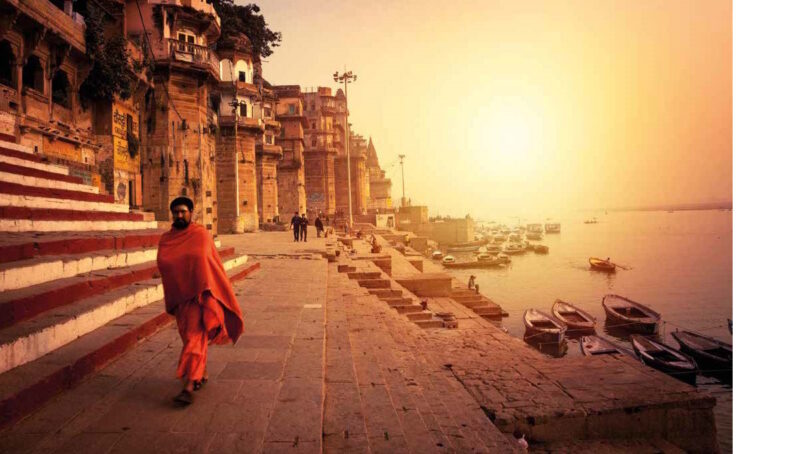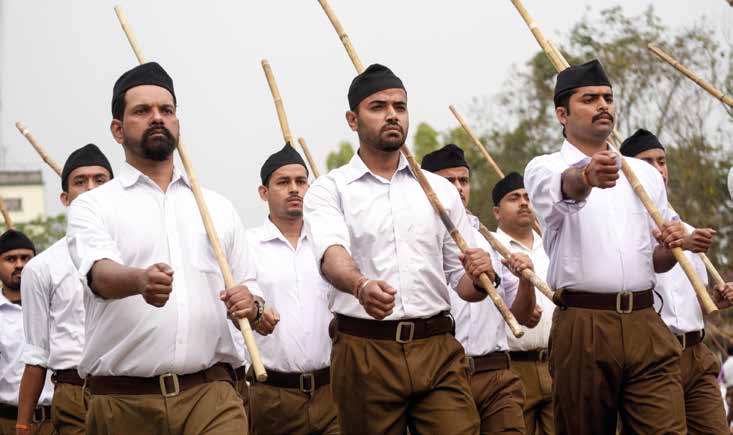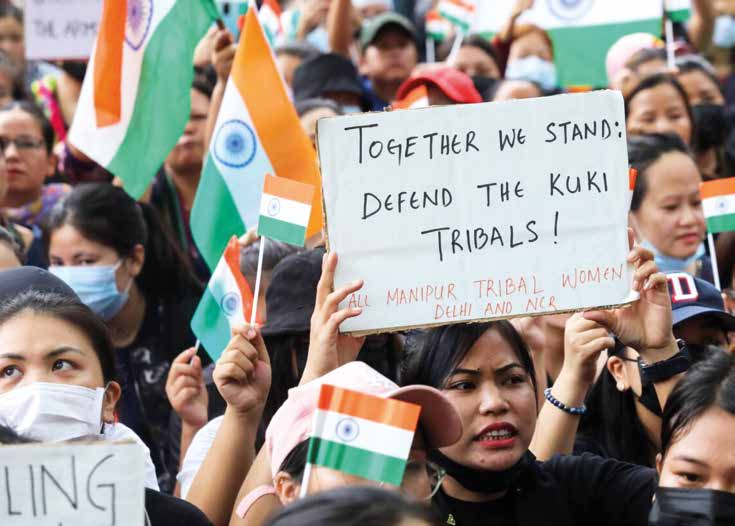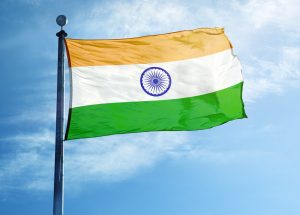Church pastors are paying a high price for sharing the gospel as the persecution of Christians spreads across the subcontinent, writes Release International’s John Lawson.

For Christians in the UK travelling to and from church on a Sunday morning may be fraught – getting a young family ready in time for a service has always had its challenges – but we rarely if ever encounter hostility on our journey.
Pastor ‘Rajendra’* wasn’t expecting trouble either, as he walked home from leading a service at his small church in a rural village in Rajasthan, but suddenly he found himself surrounded by a gang of eight men attacking him with swords, axes and metal rods. They beat him severely and left him for dead, lying bleeding in the road, not far from his house. Rajendra was saved by someone who found him and took him to hospital, where he required treatment for 40 days.
The gang who attacked him were not robbers but Hindu fanatics who wanted to drive him, his small church and all traces of Christianity out of their village. Thanks to Release International’s partner in India, Rajendra received extensive physiotherapy after his hospital treatment and a motorbike to aid his mobility, especially to and from the hilly surrounding villages.
That attack was eight years ago, but he suffers pain in his legs even now. He’s also still ministering in the same village, and sometimes he sees some of the men who attacked him (Rajendra forgave them and so the police case against them was dropped). He says they leave him alone now but he prays that one day they will come to faith and understand the forgiving love of Christ.
This case is not isolated. On our recent visit to India we met several pastors who have been physically attacked, or arrested, or both; simply for worshipping God, whether in homes, in small churches or on the street. The motivation is always the same and is one that is growing ever stronger in India: the concept of Hindutva which essentially means that to be Hindu is to be Indian and to be Indian is to be Hindu – and therefore those Indians who follow other religions are increasingly treated as second-class citizens. Particular hatred is directed at those who attempt to share their non-Hindu faith with others, namely Muslims and Christians; they have recently been branded as ‘threats to the state’ by prominent Hindu leaders.
HOTBED OF HINDUTVA
Of course, India is a vast country, and there are many and significant differences between its northern and southern states and the people who live in them. While the hotbed of Hindutva has always been the ‘cow- belt’ northern and central states, its reach is now extending into every corner of the country. Another pastor we spoke to, ‘Joshua’*, is from the southern state of Tamil Nadu, and he was badly beaten by a Hindu mob while handing out Bibles to people on the street, requiring hospital treatment for five days, (also paid for by our partner in country). He still has pain in his ears and leg today. The police released his attackers without further charge after only five days.

Like Rajendra, Joshua still sees his attackers as he ministers in the same community. He smiles at them, but they don’t respond. In his community the issue of caste also remains a real challenge. Hindus fear Christianity because it disrupts the caste system which keeps the elite at the top and the masses at the bottom. When people learn about Jesus’s love for everyone and that they are all made equally in the image of God, they start breaking free from this mentality. However, Joshua told us it still presents challenges for house-church fellowships when new believers gather in the homes of people who were from different castes to them. Ideally, he would like a separate church building, completely neutral of any caste association, in which to gather his believers together as equals, but this is becoming much harder in a place where the state increasingly colludes with Hindu mobs who will not accept new churches in their communities.
Pastor ‘Manraj’*, who comes from northwest India, knows this only too well. He recently started constructing a church building for his growing congregation and the RSS (Rashtriya Swayamsevak Sangh), a militant Hindu organisation, mobilised a mob to obstruct it and threaten them. Thankfully, in his case a prominent local Sikh politician stepped in and ensured the building could continue. However, the case of this benevolent politician is an exception in a country where many state governments (India is federal and each of its 28 states can pass their own laws) are passing ‘anti-conversion laws’ which put ever-tighter restrictions on Christian activity, contravening the constitution of India which guarantees religious freedom for all Indians. Twelve states have passed anti-conversion laws with ambiguous wording about ‘inducements’ which are easily manipulated to provoke arrest even for praying for a neighbour in their house or offering someone a Bible. This prohibition on conversion applies only to those wishing to become Christians or Muslims. Becoming a Hindu, in contrast, is not seen as conversion, but as a ‘home- coming’ for which inducements and benefits are not only permitted but often encouraged and funded by the state. Furthermore, in practice these laws do not apply only to ‘new converts’ but to anyone following minority faiths in those states. Even the traditional Anglican Church of North India has recently had its organisational status revoked by the Government, severely restricting its capacity to receive external funds. World Vision, the humanitarian aid organisation, has been similarly affected.
‘Each day in the prison was like a month. It was like hell’
Pastors who continue to minister within these states now face real risks of arrest and imprisonment as well as attacks and intimidation. Pastor ‘Mohan’*, for example, is from Uttar Pradesh (UP), which is India’s most populous state and its most fervently Hindu nationalist one. He has been repeatedly harassed by local media and questioned by the police about his ministry, including under arrest; but without sufficient evidence to press any charges he was released.
Mohan explained that a mob, who were unhappy that a family whose daughter experienced a miraculous healing after Christian prayer had stopped coming to the temple and making regular offerings, complained so much about his release that he was arrested again and imprisoned on false charges. Mohan told us that ‘each day in the prison was like a month. It was like hell’. Another prisoner beat him and he got a skin infection from a dirty prison blanket. Thankfully his brother was able to engage a lawyer who got him released after a month, but his case is ongoing, requiring him to attend court each month. Our partner in India provides legal assistance to many pastors in similar situations all over the country, but UP is the worst affected with over 130 church leaders currently in prison, many in pre-trial custody having been refused bail.
ETHNIC VIOLENCE
Such is the collusion now between the mob, hell-bent on preserving Hinduism at all costs, and the powers of the state that attacks on Christians happen brazenly and with impunity. This is nowhere more evident than in the far north-eastern state of Manipur which was riven by ethnic violence last May. The situation in Manipur is complex and the conflict between the Meitei and Kuki peoples is multi-dimensional; based upon ethnicity, politics, access to valuable protected land (legally determined by ‘Scheduled Tribe Status’, protests against the changing of which initiated the current troubles) and religion: the Kuki are almost 100 per cent Christian, whereas the Meitei are predominantly Hindu (and the neighbouring Nagas have their own traditional religious practices closely related to Hinduism). However, the testimony we heard firsthand, from both Meitei and Kuki Christians, is that the mass violence against Kukis, which has forced more than 60,000 of them to flee while state police and national security forces stood by without intervening, would never have been permitted to last so long if the Kukis were not Christian. Videos of people defiling and burning hundreds of Kuki Christian churches, with their faces uncovered, whilst armed with automatic weapons – despite a significant military presence in the area – are circulating freely on the internet, suggesting a spirit of total impunity and no fear of prosecution.
‘Even if I die, I will not stop serving the Lord’
Furthermore, the similar desecration and destruction of over 250 Meitei Christian churches, also by Meitei mobs, and again, without interruption by the authorities, suggests that, whatever the complex ethnic and political origins of the Meitei-Kuki dispute, it has become in effect a pogrom against Christians, conducted by Meitei Hindu mobs but with at least tacit support from the authorities.

Amid such accounts of pure hatred against Christians and wanton destruction of their lives and property it would be easy to be discouraged, especially as they portray an image of India which has changed so much in the past two decades, and is moving in the opposite direction to the inclusive vision of Gandhi and its other founding fathers.
However, there is much to be inspired by. ‘Motilal’* is another pastor who was brutally attacked, along with his wife, in their home in Rajasthan, and has also been arrested and fined by the police. Yet, he said, ‘Even if I die, I will not stop serving the Lord and doing the ministry he has given me in this village.’
For all these pastors, it takes great faith to step out of their house each day, not knowing where or when the next threat or attack will come from, and knowing that the police are now as likely to add to their troubles as they are to protect them. Yet, they do it anyway, continuing to love and serve God by loving and serving their neighbours, and in doing so they are reaping much fruit. Amid these accounts of hardship we also heard testimonies of people turning away from drunkenness, despair and domestic violence to follow Jesus; of poor children being educated and getting good jobs, of girls and women escaping temple prostitution, and of the sick getting healthcare, or even miraculous healing. Our partners in India are following the example of Jesus’s holistic ministry on earth and thousands of people are responding to this love as they always have done, wherever and whenever the gospel is presented in matching word and deed by people who live it out, consistently, selflessly and even to the point of ultimate sacrifice. As the leader of our partner organisation said: ‘The India we knew is gone, but the church will grow and survive if we Christians continue to live out our faith.’
*Names changed to protect identities.
 HOW RELEASE INTERNATIONAL HELPS IN INDIA
HOW RELEASE INTERNATIONAL HELPS IN INDIA
- Provides legal assistance to church leaders who have been accused and arrested
- Provides support for medical care and assistance for the injured including long-term rehabilitation
- Supplies Bibles
- Provides emergency relief such as for those displaced by violence.
You can read more stories from our latest Voice magazine here
Click the button below to sign up and receive your FREE copy of VOICE Magazine by post 4 times a year